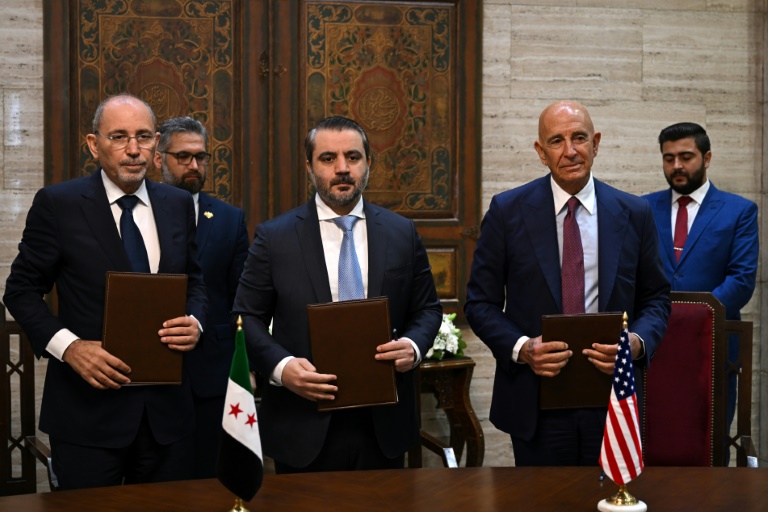Syrian forces have withdrawn heavy weapons from the country’s south where Israel has demanded a demilitarised zone, a military official said Tuesday, as Damascus announced a roadmap for restoring calm in a violence-hit southern province.
A week of sectarian bloodshed in Druze-majority Sweida province erupted on July 13 with clashes between Druze fighters and Sunni Bedouin but rapidly escalated, drawing in government forces and tribal fighters from other parts of Syria.
Israel, which has its own Druze community, intervened with air strikes on government targets, saying it was acting to defend the minority group as well as to enforce its demands for south Syria’s demilitarisation.
“Syrian forces have withdrawn their heavy weapons from southern Syria,” the military official told AFP on condition of anonymity, adding the process began around two months ago after the violence.
A diplomatic source in Damascus told AFP, also on condition of anonymity, that the withdrawal covered the country’s south up to about 10 kilometres (six miles) outside the capital.
Israeli Prime Minister Benjamin Netanyahu said in August that his country was engaged in talks to establish a demilitarised zone in southern Syria.
The two countries have technically been at war since 1948.
After Islamist-led forces toppled longtime Syrian ruler Bashar al-Assad in December, Israel deployed troops to a UN-patrolled buffer zone on the Golan Heights that has separated the countries’ forces since an armistice that followed the 1973 Arab-Israeli war.
Israel has also repeatedly bombed Syria since Assad’s fall.
Last week, President Ahmed al-Sharaa said Syria was negotiating with Israel to reach a security agreement that would see Israel leave areas it occupied in recent months.
Syrian and Israeli officials have met on several occasions in recent months, and the diplomatic source said a new meeting would be held in Azerbaijan’s capital Baku on Friday.
– ‘Historic’ measures –
Since a ceasefire ended the sectarian bloodshed in July, the situation in Sweida has remained unstable, with Sweida city controlled by local Druze forces and the rest of the province by government troops.
Foreign Minister Asaad al-Shaibani announced on Tuesday a plan backed by Jordan and the United States to restore calm in the area.
“The Syrian government has laid out a clear roadmap for action… that supports justice and builds trust,” Shaibani said in a press conference, adding that the plan involves holding accountable those who attacked civilians, compensating the people affected and “launching a process of internal reconciliation”.
Jordanian Foreign Minister Ayman Safadi, present at the event with US envoy Tom Barrack, said a “joint Syrian-Jordanian-American mechanism” would ensure the plan’s implementation.
Syrian authorities have said their forces intervened after the violence broke out to stop the clashes, but witnesses, Druze factions and the Syrian Observatory for Human Rights have accused them of siding with the Bedouin and committing abuses against the Druze.
The Observatory said the violence killed more than 2,000 people, including 789 Druze civilians “summarily executed by defence and interior ministry personnel”.
The Britain-based monitor, which relies on a network of sources inside Syria, said 516 Druze, including 103 women, had been abducted from the province since the violence erupted.
Barrack said the steps taken by the Syrian government on Tuesday were “historic”.
Hikmat al-Hijri, one of Syria’s leading Druze spiritual leaders, had called for Israel’s help during the bloodshed, and last month demanded the creation of a separate region for the minority in southern Syria.
Last month, Syrian state media said Shaibani and Israeli Strategic Affairs Minister Ron Dermer had met in Paris to discuss de-escalation and the situation in Sweida.
Earlier on Tuesday, Syrian authorities announced the creation of a new internal security chief position for Sweida city, naming a member of the Druze community to the post.
The new chief, Suleiman Abdel Baqi, leads a local armed group that is seen favourably by the new authorities.
The Syrian military official said security personnel in Sweida would comprise people from the province.
str-mam-lk/at-jos/nad/smw

